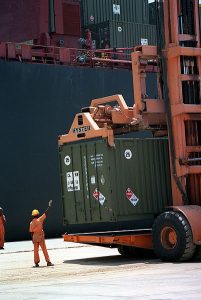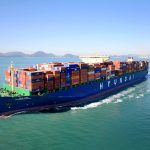Legislation Introduced to Stop Labor Slowdowns at the Ports

Dockworker and cargo containers
On Thursday (March 23, 2017), legislation was introduced to stop labor slowdowns at U.S. ports. The legislation is aptly called the Prevent Labor Union Slowdowns Act (PLUS). It was introduced by U.S. Senators Jim Risch (R-ID), David Perdue (R-GA), and Mike Crapo (R-ID).
While the International Longshore & Warehouse Union (ILWU) and International Longshoremen’s Association (ILA) are bound to hate this legislation, shippers and ports should be thrilled by action to put an end to costly slowdown tactics.
The dockworker unions commonly use slowdowns at the ports during contract negotiations and times of disagreement with employers. The slowdowns give the unions leverage in negotiations and shows their power, but the slowdowns can also create huge losses for shippers, the economy, and even America’s business reputation abroad.
When contract negotiations became contentious between the ILWU and Pacific Maritime Association (PMA) after the expiration of their previous contract, the ILWU used slowdown tactics that exacerbated congestion issues to the point of importers not getting their goods in time for holiday season sales and agricultural exporters watching their produce rot on the docks.
Senator Risch’s press release about PLUS highlights the damage these ILWU slowdowns have had on the state he represents:
“Idaho farmers, ranchers, producers and manufacturers suffered significant losses due to the west coast port slowdown in late 2014. This practice was unfair and dangerous, having immediate effects on Idaho businesses and potentially impacting the competitiveness of Idaho commodities globally for years to come,” said Senator Crapo, Chairman of the Senate Banking, Housing and Urban Affairs Committee. “This bill will enable Idaho’s business community to remain competitive when faced with labor disputes outside the state and out of our control.”
Idaho’s potato exports is just one example of damage done by dockworker slowdowns. Another example would be how ILWU slowdowns at the Port of Portland caused carriers to stop calling on the port with container ships altogether.
Slowdowns orchestrated by dockworker unions at the ports cause businesses to lose money, contracts to be lost, and jobs to end for people who have no control over what’s happening at the ports.
What PLUS does is categorize labor union slowdowns as what they are: unfair practices. The press release gives a picture of what that looks like legally along with some numbers showing how damaging slowdowns are:
The “slowdown” method is detrimental to port managers because remuneration for full benefits and salaries is required, and replacing or firing employees cannot occur. In addition, since a slowdown is currently restricted from classification as an unfair labor practice under federal labor law, port managers lack the power to call in an order from an arbiter during contract negotiations directing workers to work at a normal pace. These disputes have resulted in both shipping companies and port managers terminating their contracts to service individual ports. The U.S. Potato Board estimates that in 2015, west coast slowdowns caused massive financial damage to the food industry, including a $50 million loss to the Idaho potato industry. Other estimates include $70 million in wasted fruit in Washington, and $40 million per week loss in meat sales.
The PLUS Act would change the National Labor Relations Act, defining a labor slowdown by maritime workers as an unfair labor practice. This legislation allows injured parties to file civil actions in federal court to seek double augmented damages resulting from slowdowns, as well as recover their attorney and expert witness fees and costs.
It is likely the dockworker unions will try to fight this legislation as slowdowns are one of their most powerful weapons for gaining leverage in contract negotiations.
With contract negotiations between the ILA and the United States Maritime Alliance (USMX) approaching at East and Gulf Coast ports, this legislation can’t arrive soon enough for shippers.




